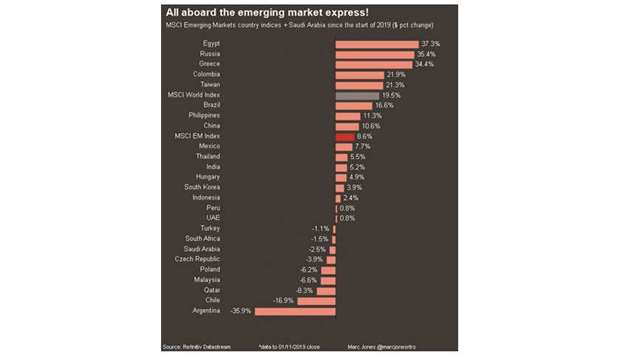South Africa’s markets rallied yesterday, on relief that Moody’s had only downgraded its outlook for the country’s debt and not cut it to junk as some had feared, while improving prospects of a US-China trade deal sent emerging market currencies to 3-month highs.
The rand jumped nearly 2% to 14.75 per dollar, leading gains among developing world currencies. Moody’s on Friday reduced the outlook on South Africa’s rating to negative, but maintained its sovereign rating at Baa3 — the lowest rung of investment grade.
Markets had anticipated such a move after a bleak mid-term budget statement last week slashed 2019 growth forecast to 0.5% and showed government debt racing to more than 70% of gross domestic product by 2023.
The rand shed about 3% last week. Johannesburg-listed shares rose 0.3% in its fourth session of gains, while yield on the 10-year local bonds dropped about 2.1%.
“Although SA was spared a downgrade to junk (at least for now)...the uphill battle is far from over.
The 2020 Budget will play a crucial role in Moody’s next step,” Daria Parkhomenko, an FX strategist at RBC wrote in a client note.
The negative outlook means there is a window of 12-18 months in which a downgrade could be delivered, but it could come sooner if Moody’s isn’t impressed by the fiscal picture presented at the next budget statement in February.
“A downgrade would exclude local currency SAGB bonds from the World Government Bond Index with a detrimental knock-on effect on portfolio flows and the government’s borrowing costs,” ING’s Trieu Pham wrote.
Among other currencies, the South Korean won jumped 0.3% after President Moon Jae-in suggested high-level talks to resolve a deepening political and trade row with Japan during a meeting with Prime Minister Shinzo Abe.
The Russian rouble gained 0.3% despite lower oil prices, while the Turkish lira was steady after consumer price index fell to 8.55% in October, its lowest level in nearly three years due to temporary measurement “base effects” from last year.
The Chinese yuan rose 0.2% in offshore trading to near 11-week highs after the United States and China said on Friday they made progress in talks aimed at defusing a nearly 16-month-long trade war that has harmed the global economy, and US officials said a deal could be signed this month.
The trade headlines, tied to a better-than-expected US job growth, helped ease worries about a global slowdown, driving the MSCI index of emerging market stocks up 1.1%. Chinese stocks jumped more than half a %, while Hong Kong shares shot up 1.7% to touch a three-month high as investors shrugged off another weekend of chaotic clashes with anti-government protesters that led China to call for a tougher stance.
Lebanon also saw fresh uprisings over the weekend demanding the overthrow of their country’s elite, days after Saad al-Hariri resigned as prime minister.
The head of the banking association said last week that Lebanon’s banks did not see “any extraordinary movement” of money on Friday or Saturday, the first two days they reopened to the public after a two-week closure due to nationwide protests.

.
